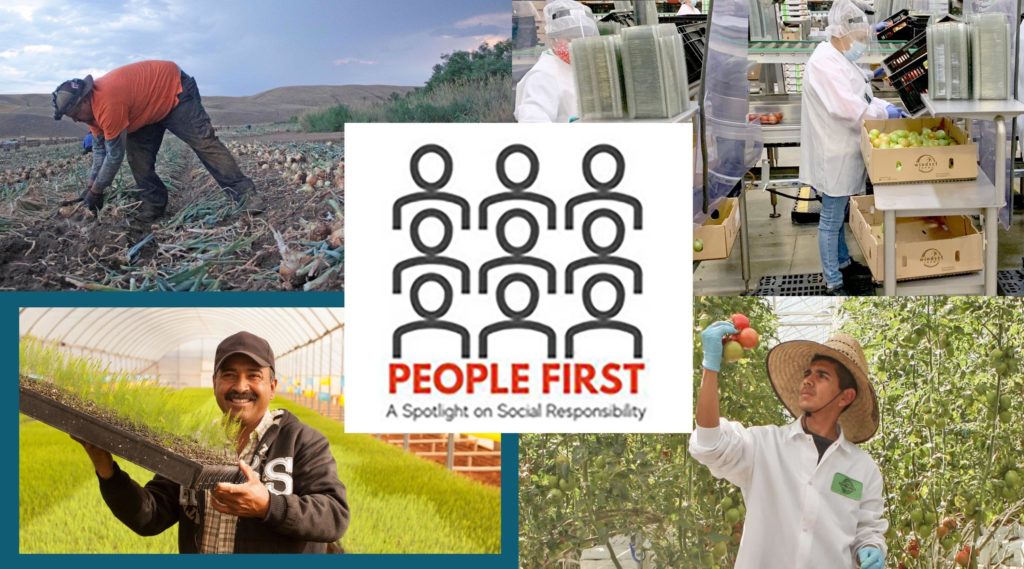How Upskilling and Credentialing Are Key to Meeting the Supply Chain Needs of the Future

In the third webinar of the People First series presented by The Packer and Equitable Food Initiative (EFI), Erika Castro, Human Resources Specialist for Windset Farms®, and Vivian Page, Vice President of Human Capital for Stemilt Growers, discuss how upskilling and credentialing agricultural workers is key to developing the competency to meet the supply chain needs of the future. Their conversation is facilitated by Kevin Boyle, Director of Business & New Product Development for EFI.



Change is happening continuously in the agricultural industry and with it comes the need to create healthier workplaces, better efficiency and quality, and increased productivity for fresh produce companies.
Two topics bringing transformative power to the needs of this changing industry are upskilling and the professionalization of agricultural work.
The State of Upskilling in Agriculture
A Human Resources Shift in Vision and Focus Is a Foundation for Providing Intentional Growth Opportunities
According to Page, as a human resources team shifts its focus from compliance to partnership, the way that team does its job changes. When focusing on partnership, teams work to connect with every employee, communicate about the career path possibilities and invite feedback. These connections lay a foundation for upskilling employees with purposeful intention.
“One of the main responsibilities of the employer is to start creating a transformation in how we see people—not seeing people as resources or assets, but humans—and to also start connecting with those humans as humans, as equals. The companies that know how to do that and do it well, will be the ones that are able to get ahead because they will be able to attract the right talent for the organization.”
– Vivian Page, Vice President of Human Capital for Stemilt Growers
Adapting to Technology and Adapting Technology
Castro says in today’s work environment, adaptability of workers is imperative. For instance, Windset Farms sees many employees coming from the field to the greenhouse who know how to pick, pack and care for produce, but in the greenhouse environment they also need to pick up the new skill of using a scanner.
At Stemilt, Page has plans to use technology to connect and offer upskilling training and education in a more efficient way. The cell phone can be a democratizer, making education and training accessible in a new way. Page is exploring ways to deliver education to Stemilters while they are in the orchards instead of having to assemble at a training center.
Career Pathways and Hiring From Within
During the annual employee appraisals at Windset Farms, human resources personnel track new skills and growth interests of employees. When new positions open, the company is able to first review the skills and qualifications of its own workforce before opening the position externally.
“Often times we see a path for somebody and we put them in that path but the person isn’t interested. Being heard and listening well are key skills in terms of the HR group or the human capital group connecting with the workforce.”
– Vivian Page, Vice President of Human Capital for Stemilt Growers
Elevating the Skills of Leaders
Managers and supervisors with leadership and communication skills are vital to building strong long-term teams. Castro commented that oftentimes employees don’t leave a bad company but instead leave a job to get away from a bad manager or supervisor. Focusing upskilling efforts on leadership and growth opportunities for managers and supervisors will effectively reach the entire workforce as these leaders improve team-leading skills.
Organizational Culture Characteristics That Affirm the Professionalization of Farmwork
The professional quality of work taking place in orchards and greenhouses is recognized through the support of an organization’s culture. Castro and Page identify three characteristics of an organizational culture that affirm the professional quality of farmworkers’ responsibilities.
- The employer’s value system respects each employee as a whole human being with an important role to play in the company’s success.
- The company focuses on good communication and improving communication – for instance, making educational materials and business communications available in the employee’s preferred language or native language. Castro has found the use of pictograms and images to be helpful tools of connection.
- There is a top-down vision for career pathways, with upper management in agreement about the organizational structure and what positions can exist. At the same time, employees are engaged with their managers and supervisors to develop the skills required to get to the next level.
Establishing the Professionalization of Farmwork in the Industry
Establishing the vision of professional career pathways in agriculture will mean engaging the right partners, consumers and retailers and the next generation of agricultural workers.
Engaging Partners
Industry partnerships and partnerships with the wider community provide connections and outlets for education.
Both Castro and Page reference their companies’ partnerships with EFI as a boost to their efforts to improve the lives of their employees at work and outside of work and as a way to educate and reach out to consumers and provide differentiation in the industry to attract workers.
Partnering with community colleges can bring in fresh talent and cast vision for careers in agriculture.
Connecting with the area’s congressperson and sharing the challenges a farming operation is navigating and needs for the future is another important partnership outreach.
Engaging Consumers and Retailers
Over the past decade, consumer awareness has led to advocating for better work environments for farmworkers and more sustainable growing practices. Retail companies have made changes due to the pressure coming from consumers.
Providing more education for consumers and retailers regarding the process of growing, harvesting and transporting fresh produce helps inform consumer opinion regarding the high level of skills required for farmwork.
“Consumers and the retail stores have to be more involved and able to see what our workers do every day to bring the best produce to their table.”
– Erika Castro, Human Resources Specialist for Windset Farms
Engaging the Next Generation
Casting vision for career pathways in agriculture changes the entry point for future employees. Whereas the upcoming generation might have a default view of agricultural work as the work of previous generations, the addition of a credential and the projection of a library of transferable skills and a pathway up a career ladder can draw attention to the ways agriculture is changing and the opportunities for advancement that exist within it.
One area of new focus and employer responsibility, according to Page, is to consider the effects of mental health of staff and managers and provide an improved workplace environment through the provision of mental health support.
“The future of our company hinges on our ability to create enough attraction and differentiation to bring in that young workforce and help them understand that there is a career in agriculture—that agriculture is something that you can get into rather than need to escape from. That’s where the partnership with EFl has become so valuable.”
– Vivian Page, Vice President of Human Capital for Stemilt Growers
How EFI Is Working Toward the Professionalization of Farmwork
Over the next three to five years, EFI plans to work with partners to identify and build a library of transferable skills, competencies and knowledge of professional agricultural workers that accounts for the changing technology required in agricultural jobs.
To find out more about EFI’s work to provide upskilling training for the fresh produce industry, reach out to Kevin Boyle.
Watch webinar 3: Hiring for the Skills of Tomorrow
Other Posts in the People First Series:
Challenges and Opportunities: Rethinking the Way Work is Done Adds Value to the Supply Chain
Solving Labor and Recruitment Challenges: Navigating the H-2A Program
Intro to the Ethical Charter on Responsible Labor Practices
How Responsible Recruitment Practices Unlock Competitive Advantage
Myths and Realities of Social Compliance
Summary written by: Amy Beth Dingle, Freelance Writer for EFI

